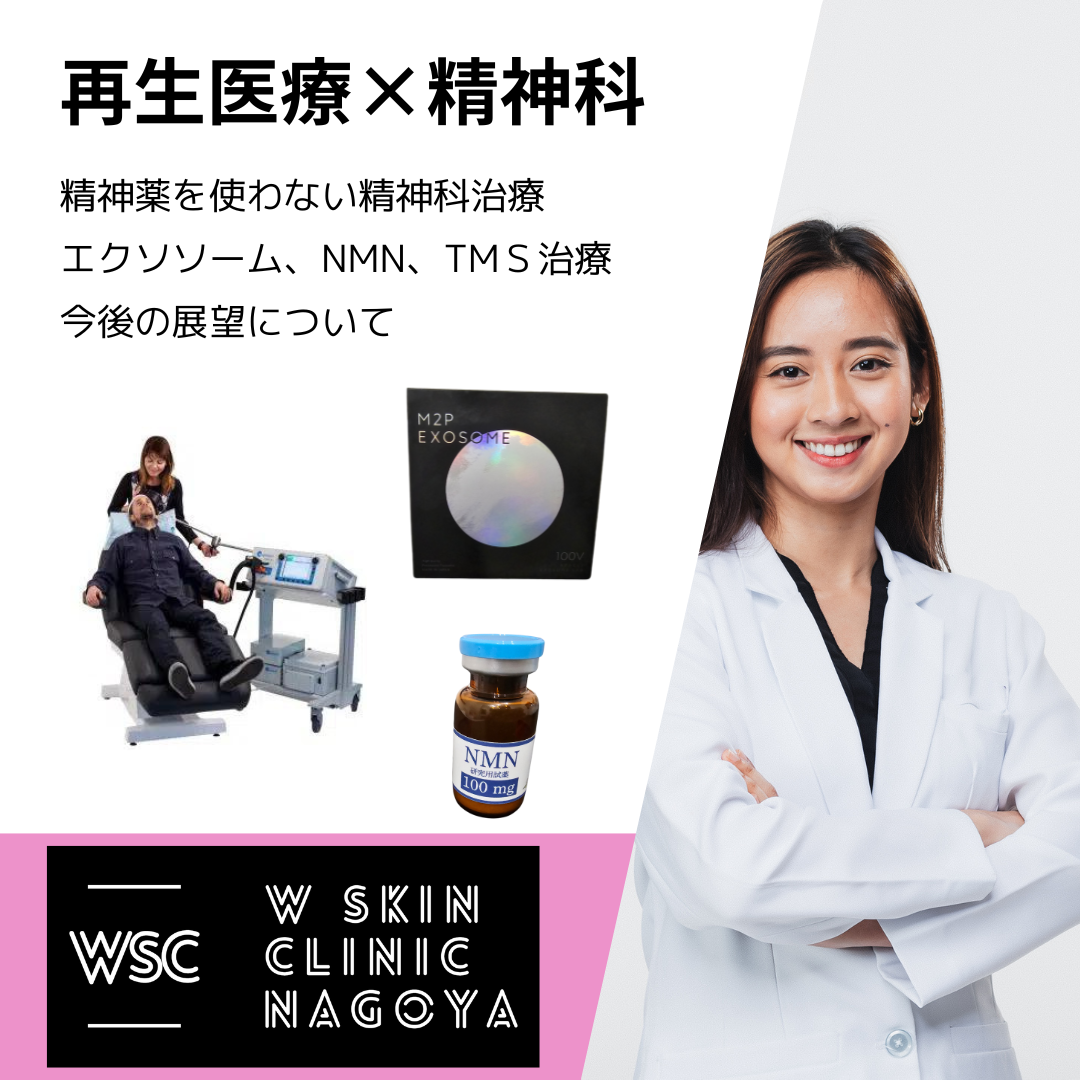NEWSお知らせ
2024.12.06|ブログ
再生医療×精神科治療、TMS治療、エクソソーム点滴、NMN点滴、などを利用した精神科薬を使わない治療は今後さらに進化していくか?名古屋の美容皮膚科医が解説

再生医療×精神科治療、TMS治療、エクソソーム点滴、NMN点滴、などを利用した精神科薬を使わない治療は今後さらに進化していくか?名古屋の美容皮膚科医が解説
こんにちは、Wスキンクリニック名古屋、院長の加藤晃司です。
今回は、再生医療×精神科治療、TMS治療、エクソソーム点滴、NMN点滴、などを利用した精神科薬を使わない治療は今後さらに進化していくか?について解説します。
再生医療と精神科治療を組み合わせた新しい治療法(TMS治療、エクソソーム点滴、NMN点滴など)は、今後さらに進化していく可能性が非常に高いです。その理由を以下に詳しく説明します。
- 再生医療×精神科治療の進化の背景
(1) 精神科薬の課題
副作用:
精神科薬は効果がある一方で、体重増加、倦怠感、依存性などの副作用が問題となることがあります。
治療抵抗性:
一部の患者では従来の薬物療法が効果を示さず、治療抵抗性うつ病などが増加しています。
社会的要請:
精神科薬に依存しない治療法を求める患者の声が増えており、より根本的な治療法が求められています。
(2) 再生医療の技術的進化
再生医療は近年急速に進化しており、細胞治療や分子療法がより効果的かつ安全になっています。
エクソソームやNMNなどの分子療法は、組織の再生や細胞修復に直接働きかけるため、脳や神経系に対する新しいアプローチとして注目されています。
- 各治療法の可能性と根拠
(1) TMS治療(経頭蓋磁気刺激療法)
現状:
TMS治療はうつ病や強迫性障害(OCD)の治療において効果が実証されています。
非侵襲的で副作用が少ないため、薬物療法に代わる選択肢として広がりつつあります。
進化の可能性:
機能的MRI(fMRI)や脳波検査(EEG)と組み合わせることで、個々の患者に最適化したターゲティングが可能になり、治療効果がさらに向上。
治療対象が拡大する可能性(例えば、ADHDやPTSDなど)。
(2) エクソソーム点滴
現状:
エクソソームは細胞間の情報伝達に関与し、抗炎症作用や神経再生作用があるとされています。
初期研究では、神経系の修復や炎症の軽減に効果があることが示唆されています。
進化の可能性:
精神疾患において脳内炎症や神経細胞の損傷が関与していることが明らかになりつつあり、エクソソームはこれらの課題を直接改善できる可能性。
特に、慢性的なストレスやトラウマが引き起こす神経損傷に対して有望視。
(3) NMN点滴
現状:
NMN(ニコチンアミドモノヌクレオチド)はNAD+の前駆体であり、細胞エネルギー代謝やDNA修復に重要な役割を果たします。
動物実験では、NMNが認知機能を改善し、抗うつ効果が示されています。
進化の可能性:
老化や慢性疲労が関与する精神疾患(うつ病、認知症)への治療可能性。
長期的な神経保護効果が期待され、加齢性精神疾患の予防や治療に応用が広がる。
- 再生医療×精神科治療が進化する根拠
(1) 科学的根拠の蓄積
精神疾患が単なる「化学的不均衡」ではなく、脳内炎症、神経細胞の劣化、エネルギー代謝の低下など、多面的な要因によるものであることが分かってきました。
再生医療技術(エクソソーム、NMN、幹細胞)はこれらの多因子に直接作用するため、根本的な改善が可能です。
(2) 個別化医療の進展
遺伝子検査や脳スキャン技術の進化により、患者ごとに適した治療法を選択する「個別化医療」が普及しつつあります。
再生医療とTMS治療は個別化医療に適しており、特定の脳部位や分子メカニズムをターゲットにした治療が可能です。
(3) 副作用の少なさ
再生医療や非侵襲的な治療法は、従来の薬物療法に比べて副作用が少なく、長期的な使用に耐えられる点が患者にとって大きなメリットです。
(4) 社会的ニーズの増加
精神疾患に対する偏見が減少し、多くの人が治療を求めるようになっています。
薬物療法に頼らない治療法が広まることで、精神医療へのハードルが下がり、治療の普及が進むと予測されます。
- 今後の展望と課題
(1) 期待される進化
ハイブリッド治療:
TMS治療にエクソソームやNMN点滴を組み合わせた多面的アプローチが標準化する可能性。
技術の進化:
再生医療のコストが下がり、より多くの患者が利用可能になる。
ナノテクノロジーやAI技術を用いた治療効果の最適化。
(2) 課題
エビデンスの蓄積:
再生医療が精神疾患に効果的であることを証明する大規模な臨床試験が必要。
コストの削減:
現在、再生医療は高額であるため、普及にはコスト削減が必須。
規制の整備:
再生医療を精神科治療に応用するための法的枠組みやガイドラインの整備が求められます。
- 結論
再生医療と精神科治療を融合した新しい治療法(TMS治療、エクソソーム点滴、NMN点滴など)は、今後さらに進化する可能性が高いです。その根拠は以下の通りです:
精神疾患の多因子性に対応する治療法としての適性。
科学的エビデンスの蓄積と技術の進化。
個別化医療や副作用の少ない治療への需要の高まり。
社会的なニーズの増加。
これらの治療法は従来の薬物療法に代わる有力な選択肢となり、精神医療の未来を大きく変える可能性を秘めています。
当法人では精神科治療に再生医療から生まれた治療を積極的に導入しています。
精神科薬は重要な治療方法ですが、ほんとになんらかの精神科診断がつくくらい重たい状態の人以外には、副作用の方が目だつ治療です。
そんな方たちのために、現在はTMS治療、エクソソーム治療、NMN治療を組み合わせ提案しています。
今後さらに再生医療の進化とともに、提案できる治療は増えていくはずです。
エビデンス蓄積のためデータ集積し論文発表もしています。
モニターも随時募集していますので、ご興味のある方はクリニックまでお問合せください。
再生医療×精神科を一つのテーマにして、新たな治療領域を作っていきます。
<当院で施術可能な、再生医療×精神科治療>
TMS治療はこちら
https://www.w-clinic-nagoya.com/tms
Wスキンクリニック名古屋でのエクソソーム治療はこちら
https://www.w-clinic-nagoya.com/acne/exosome
NMN点滴はこちら
https://www.w-clinic-nagoya.com/beauty-drip/nmn
高濃度ビタミンC点滴はこちら
https://www.w-clinic-nagoya.com/beauty-drip/vitamin-c
*当院では
NMNは一般社団法人NMN医療研究会、エクソソームはセルソース株式会社のM2P-エクソソームを使用しています。
当院では無料でスタッフカウンセリングを行なっております。
お気軽にご予約くださいませ
Wスキンクリニック名古屋 (美容皮膚科)
https://www.w-clinic-nagoya.com/
〒461-0005 愛知県名古屋市東区東桜 2-4-1 第3コジマビル6F
TEL 052-7377-7117(10:00~19:00)
LINE ID @w.nagoya
高岳駅より徒歩4分 / 新栄町駅より徒歩5分
お車でお越しの方
名鉄協商パーキングチケットをお渡しいたしますので、クリニック近くのパーキングをご利用ください。
ご予約、お問合せ、Wスキンクリニック名古屋公式LINEからも可能です。
LINE ID : @w.nagoya
友達追加は↓から
Wスキンクリニック名古屋公式インスタ↓
https://www.instagram.com/w.skinclinic.nagoya?igsh=NHhoODFnaXB2b2ll&utm_source=qr
Wスキンクリニック院長 加藤晃司インスタ↓
https://www.instagram.com/w.skin.nagoya.kojikato?igsh=aW9nbWZwNjNjZ3pz&utm_source=qr
Will Regenerative Medicine Combined with Psychiatric Treatments Like TMS, Exosome Drips, and NMN Drips Continue to Advance? Explained by a Cosmetic Dermatologist in Nagoya
Hello, this is Dr. Koji Kato, Director of W Skin Clinic Nagoya.
Today, I’ll discuss whether regenerative medicine combined with psychiatric treatments—such as TMS therapy, exosome drips, and NMN drips—will continue to evolve as non-pharmaceutical options for psychiatric care.
The integration of regenerative medicine into psychiatric treatment holds great potential for further advancement. Below, I’ll explore the reasons why this field is set to grow and the promising evidence supporting it.
- Background of Regenerative Medicine in Psychiatry
(1) Challenges of Psychiatric Medications
Side Effects:
While effective, psychiatric medications often come with side effects like weight gain, fatigue, and dependence.
Treatment Resistance:
Some patients do not respond to traditional drug therapies, leading to conditions such as treatment-resistant depression.
Social Demand:
There is a growing call for non-drug treatments, with patients seeking more fundamental solutions for their mental health conditions.
(2) Advances in Regenerative Medicine
Rapid progress in regenerative medicine has made cell-based and molecular therapies more effective and safer.
Treatments like exosomes and NMN target cellular repair and tissue regeneration, offering novel approaches for brain and nervous system health.
- Potential and Evidence for Each Therapy
(1) TMS Therapy (Transcranial Magnetic Stimulation)
Current State:
Proven effective for depression and obsessive-compulsive disorder (OCD), TMS is non-invasive and has minimal side effects, making it an appealing alternative to drug therapy.
Future Possibilities:
Combining TMS with technologies like functional MRI (fMRI) and EEG for personalized targeting to enhance efficacy.
Expanding indications to include ADHD, PTSD, and other conditions.
(2) Exosome Drips
Current State:
Exosomes are involved in cellular communication and exhibit anti-inflammatory and neuroregenerative properties. Early studies suggest they can help repair neural damage and reduce inflammation.
Future Possibilities:
With growing evidence that brain inflammation and neural damage play a role in psychiatric disorders, exosomes may address these issues directly, particularly for chronic stress and trauma-induced damage.
(3) NMN Drips
Current State:
NMN (Nicotinamide Mononucleotide) is a precursor to NAD+, essential for energy metabolism and DNA repair. Animal studies have demonstrated NMN's potential to improve cognitive function and exhibit antidepressant effects.
Future Possibilities:
NMN could be used to treat mental health conditions linked to aging and chronic fatigue, such as depression and dementia, offering long-term neuroprotection and prevention.
- Why Regenerative Medicine in Psychiatry Will Evolve
(1) Growing Scientific Evidence
Psychiatric disorders are now understood as multifactorial, involving brain inflammation, neuronal degradation, and metabolic decline—not just chemical imbalances.
Regenerative medicine (e.g., exosomes, NMN, stem cells) can address these multifactorial issues, enabling fundamental improvements.
(2) Advances in Personalized Medicine
Genetic testing and brain imaging advancements enable tailored treatment plans.
Regenerative therapies and TMS are well-suited for personalized approaches, targeting specific brain areas and molecular pathways.
(3) Low Side Effect Profile
Regenerative therapies and non-invasive methods like TMS are less likely to cause side effects, making them safer for long-term use compared to conventional medications.
(4) Increasing Social Demand
Stigma surrounding mental health is decreasing, with more people seeking treatment.
The rise of non-pharmaceutical treatments lowers barriers to care and encourages wider adoption.
- Future Prospects and Challenges
(1) Expected Developments
Hybrid Treatments:
Combining TMS therapy with exosome and NMN drips to create a multifaceted treatment approach.
Technological Advancements:
Lower costs for regenerative medicine, making it accessible to more patients.
Incorporation of nanotechnology and AI for optimized treatment protocols.
(2) Challenges
Evidence Accumulation:
Large-scale clinical trials are needed to validate the effectiveness of regenerative therapies for psychiatric disorders.
Cost Reduction:
High costs remain a barrier; reducing these is crucial for widespread adoption.
Regulatory Frameworks:
Legal and ethical guidelines for the application of regenerative medicine in psychiatry must be established.
- Conclusion
The integration of regenerative medicine with psychiatric treatments—such as TMS therapy, exosome drips, and NMN drips—is highly likely to continue advancing. This evolution is supported by:
The ability to address multifactorial causes of psychiatric disorders.
Growing scientific evidence and technological advancements.
Increased demand for personalized and low-side-effect treatments.
These therapies present a promising alternative to traditional drug-based approaches and have the potential to revolutionize the future of mental health care.
At our clinic, we are actively incorporating regenerative medicine into psychiatric treatment plans, offering options such as TMS therapy, exosome drips, and NMN therapy. While psychiatric medications remain essential for severe cases, their side effects often outweigh benefits for milder conditions.
We are committed to offering innovative, evidence-based treatments and are continuously collecting data for academic presentations and publications.
We are also recruiting participants for clinical trials and studies. If you are interested, please contact our clinic.
With regenerative medicine as a cornerstone, we aim to create new therapeutic paradigms in mental health care.




